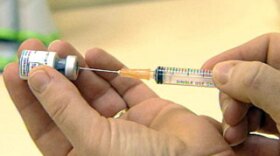A few weeks ago, as Duke Regional Hospital prepared for its first coronavirus cases, the unit headed by Dr. Megan Brooks was tapped to handle incoming patients suspected of having COVID-19.
"These patients usually, initially come through the emergency room and so there's a respiratory triage area that's set up outside the emergency room in a tent," said Brooks, a hospital medicine specialist at DRH.
This has all been really just really smart 'McGuyveristic' people thinking about 'Hey, how can we interact with patients on a more limited basis to prevent exposure,' to reduce PPE utilization, and ultimately keep our health care workers safe. -Christian Lawson
As part of the admissions process, she explained, a physician would normally question the patient face-to-face to get a medical history.
But the virulence of coronavirus poses a grave risk for health care workers coming into close contact with infected patients – and the personal protective equipment, or PPE – worn by doctors and nurses dealing with such cases is in short supply.
"If our caregivers get sick then we don't have people to take care of other folks," Brooks said.
As the number of COVID-19 cases rises, North Carolina hospitals, like facilities across the country, are scrambling to figure out how to care for patients and protect staff from contracting the potentially lethal illness caused by coronavirus. Duke Regional is piloting the use of some commonly used technology to protect health care workers and conserve some of that PPE.
"We have iPads with a two-way video program and we can talk to patients," Brooks said, describing it as similar to the FaceTime app only more secure.
This way doctors taking that initial history from a COVID-19 patient can do so without having to don – and then dispose of – all that precious protective gear.
And Brooks said the video chat may actually provide some patient-caregiver intimacy otherwise lost amid the precautions needed in an infectious disease environment.
"It means that the patient can actually see our face, which they can't under all the protective equipment if we're in the room, and we can sit there and actually spend some time with them. We can take histories, we can ask them if they need anything," said Brooks.
She said the method of communication is also being used by others helping shepherd COVID-19 patients through this ordeal, like chaplains, nutritionists and physical therapists.
Eventually, the plan is for all hospitals in the Duke University Health System to use iPads in this manner.
Hospitals Use Technology to Help Care For COVID-19 Patients
Duke hospitals is also acquiring bluetooth stethoscopes, which can transmit vital information about a COVID-19 patient to a nurse or physician from a safe distance. That is happening at UNC Hospital, too.
"It's connected to the provider's iPhone or device and the patient places it on their chest, you just point to where they need to place it, have them take deep breaths, explained Christian Lawson, a registered nurse and Director of Emergency Services at UNC Health. "And then, there, the provider's actually auscultating the patient from 20 feet outside the room."
Lawson said the gravity of the coronavirus pandemic--and the risks it poses to health care workers, in particular--is forcing hospitals to come up with creative solutions, much as a television character known for being resourceful.
"This has all been really just really smart 'McGuyveristic' people thinking about 'Hey, how can we interact with patients on a more limited basis to prevent exposure,' to reduce PPE utilization, and ultimately keep our health care workers safe," he said.
UNC has also set up a virtual triage process for identifying – and isolating – COVID-19 patients.
After driving up to the E.R., COVID patients are greeted by a nurse in head-to-toe protective gear, who hands them a smart phone-like device. Then the patient talks to a physician, who can take a history without having to burn through more PPE.
Confirmed COVID patients are taken to a special unit accessible from the outside by a dedicated door.
"So we don't have to walk patients all the way through the lobby and other areas where we would expose other patients," said Lawson.
It's another small but essential detail in the effort to stem the tide of an outbreak that hasn't yet reached its peak in North Carolina.







